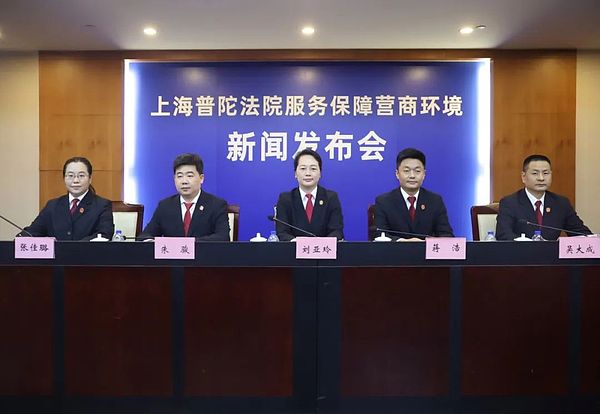Source: Shanghai Pudong District People's Court
On the afternoon of November 28, the Shanghai Pudong District People's Court (hereinafter referred to as the Pudong District People's Court) held a press conference to release the "Typical Cases of Shanghai Pudong District People's Court in Optimizing the Business Environment in 2024" (hereinafter referred to as the Typical Cases) and the "White Paper on the Trial of the Shanghai Pudong District People's Court on Adhering to and Developing the "Fengqiao Experience" of Intellectual Property Disputes in the New Era" (hereinafter referred to as the White Paper).

At the meeting, the Pudong District People's Court released a number of typical cases, covering multiple dimensions such as the protection of new business forms, the protection of corporate rights and interests, and the regulation of market order.
For example, in a case involving a digital collection sale contract dispute, the Pudong District People's Court conducted a useful exploration of the legal boundaries of the digital economy with an open and inclusive judicial perspective. In a case involving an intellectual property licensing contract dispute, the Pudong District People's Court proposed a "package" dispute resolution model with a systematic mindset to find a balance between protecting technological innovation and practicing judicial justice.
Case 1
Determine the validity of the digital collection sales contract and protect the new quality productivity——Tang Mouhong and a Shanghai technology company and others’ sales contract dispute
Case brief
In August 2022, Tang Mouhong learned through the Internet that a mobile phone application software operated by a Shanghai technology company sold digital collections, so Tang Mouhong downloaded the application software and registered as a user. From August 2022 to December 2022, Tang Mouhong successively spent 193,598.08 yuan on the application software to purchase digital collections, and could view the purchased digital collections through the "Tianhe Chain" blockchain link address built by a Shanghai technology company. On December 20, 2022, a Shanghai technology company stopped the operation of the application software and required all buyers to apply for a refund of 20% of the price of the purchased digital collections, but Tang Mouhong did not agree. Now a certain technology company in Shanghai has stopped operating its application software, and Tang Mouhong is unable to view the purchased digital collections through the "Tianhe Chain" blockchain link address. Therefore, he sued and claimed that a certain technology company in Shanghai should return all the payment of 193,598.08 yuan, compensate Tang Mouhong for his losses according to law, and claimed that the shareholders of a certain technology company in Shanghai, a certain digital technology company in Chengdu, and Zhang Mouhua should bear the responsibility for paying off the company's debts. After trial, the Pudong District People's Court of Shanghai held that the transaction between Tang Mouhong and a certain technology company in Shanghai on digital collections met the nature of a sales contract. The contract did not violate the mandatory provisions of laws and regulations, nor did it violate public order and good customs, and was legal and valid. After the court's explanation, the parties reached a mediation agreement in court, and a certain technology company in Shanghai, a certain digital technology company in Chengdu, and Zhang Mouhua jointly returned part of Tang Mouhong's money, and the litigation costs were borne by a certain technology company in Shanghai, a certain digital technology company in Chengdu, and Zhang Mouhua. The People's Court reviewed the legality of the mediation agreement and confirmed it. The mediation agreement has been fulfilled.
Judgment Summary
Digital collections are emerging digital products born under Web3.0 technology. Based on blockchain technology, they generate unique digital certificates for specific works. They have artistic characteristics, uniqueness, scarcity and other characteristics, enjoy exchange value and property value, and meet the characteristics of "commodities". At present, my country's laws and regulations do not prohibit the issuance and trading of digital collections. According to the principle of "anything is allowed unless prohibited by law" in the civil and commercial fields, the sales contract with digital collections as the subject matter is legal and valid.
Typical Significance
This case is a typical case of the people's courts fulfilling their functions of serving and safeguarding scientific and technological progress in the new era and protecting new quality productivity. New quality productivity is a new quality state of productivity in the era of new technological revolution and new industrial revolution, reflecting the new changes and new trends in the development of advanced productivity in Chinese society. The development of new quality productivity requires the people's courts to accurately grasp their positioning, give full play to the judicial guarantee function, and properly handle the new contradictions encountered. This case takes digital collections as the starting point. On the basis of affirming its legal validity, it successfully resolves the dispute between the parties through civil mediation. In the context of developing new quality productivity, it not only gives legal evaluation and appropriate protection to new products in the form of "digital +", but also effectively implements the "Fengqiao Experience", realizes the substantial resolution of contradictions, and effectively enhances the people's sense of gain and satisfaction.
 Weatherly
Weatherly



